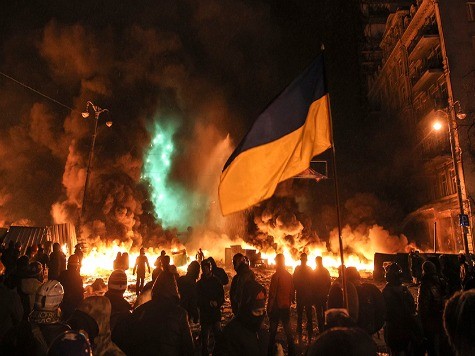Russia President Vladimir Putin stopped the $15 billion bailout to Ukraine until they have a functioning government as parliament passed amnesty to the protesters.
That bailout is the reason why Independence Square in Kiev, Ukraine’s capitol, has been packed with protesters since late November. Yanukovich chose the bailout over a trade agreement with the European Union. The protests did not become violent until January 16 when parliament passed harsh anti-demonstration laws.
The protesters want Yanukovich to resign and the government to hold early elections. He is seen as pro-Russia and his presidential election in 2010 was questionable. He and parliament have made a few concessions, such as Prime Minister Mykola Azarov and cabinet resigning and revoking the anti-demonstration laws. Those who resigned will stay in power until a new government is formed. However, the opposition said they will not stop protesting until Yanukovich resigns.
Putin said Ukraine’s president will not change the bailout, but Prime Minister Dmitry Medvedev suggested they wait to see what happens.
Just hours after Russian president Vladimir Putin said the deal would stand regardless of who ran Ukraine, his prime minister, Dmitry Medvedev, suggested waiting until “we understand what sort of government there will be, who will be working in it and what rules they will stick to”.
“Even under the lower [gas] price they are telling us that they can’t pay. This really changes the situation,” Mr Medvedev said.
Mr Putin replied: “That’s sensible. Let’s wait for the new Ukrainian government to be formed.”
On January 25 and 26, though, Putin sent warnings to the West, specifically to the United States, not to interfere with Ukraine. He also denied any Russian involvement in Ukraine clashes. He said it would be unacceptable for them to in intervene in Ukraine’s internal problems.
Yanukovich and parliament took another step by granting amnesty to protesters as long as they evacuate all government buildings and not charged with a major crime. The bill passed by 232 votes to 11. 173 Members of Parliament did not vote. The opposition is not falling for it and Arseniy Yatsenyuk, head of the Fatherland Party and one of the top opposition leaders, said he did not know what was in the bill. Vitali Klitschko, boxer-turned-politician and opposition leader, said they will not accept it.
“People took to the streets because they want to change the situation,” Klitschko said. “A statement, ‘We will free people, if they go home’ is unacceptable. It cannot be understood.
“Today, the key issue is the confrontation between people and government,” he said. “Withdrawal of charges and amnesty is not enough.”
European Union’s foreign policy chief Catherine Ashton traveled to Ukraine to mediate talks between Yanukovich and the opposition. Protests are popping up in the pro-EU west, but they are now leaking into the pro-Russia east. Justice Minister Olena Lukash threatened state of emergency if protesters did not leave the justice building, but parliament quickly said that was not on the table.
Leonid Kravchuk, Ukraine’s first president, 1991-1994, after they broke off from the Soviet Union, said there could be a civil war.
The parliament won’t reconvene until February 4, and the opposition hasn’t announced its next move. That leaves the volatile situation in limbo, much like its been for weeks.
Kravchuk said there’s real urgency to find an answer to this crisis, even if the answer itself is not clear.
“Let’s be honest, the situation is dramatic. Both Ukraine and the world recognize the country is on the brink of civil war,” Kravchuk said.

COMMENTS
Please let us know if you're having issues with commenting.